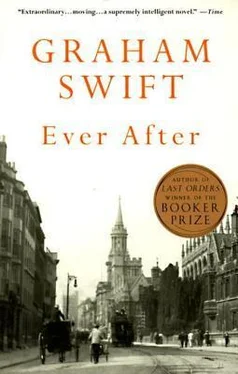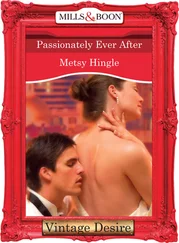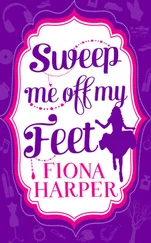It could have been her. It could have been us.
And now she has stopped. Now she wants to know about me, how it was with me. She wants to know about Ruth.
But how do you begin? I can’t find words. Something is happening. Something is stuck, struggling inside me. Something is turning completely around, inside-out — and she, now, is the calm, re-embodied one, watching me dissolve.
She gets up. She comes and stands by my chair and takes my hand. I don’t know if her intention is to lead me, there and then, into my bedroom or merely to kiss me sweetly, briefly, and say something sad, wise and conclusive. But I resist the tug of her hand. I don’t know if this hurts her, but she draws her hand away as quickly as I draw mine, as if it’s her mistake — all her fault again — then she moves away to the window, her back towards me. She says nothing, but her back — her whole person — is eloquent.
I get up. I go to the window. I stand beside her. It is possible, by an effort, not to touch. There flashes through my mind a whole course of events — a whole fairy-tale prognosis — that I will only institute later (though, tell me, was it necessary to have been jerked back from the gates of death first? Do only ghosts have initiative?). I will give her the Notebooks. I will send her back to her husband. Oh, the true, chaste knight, a true Sir Galahad! She is Potter’s wife; Potter is her husband. Potter, with the Notebooks, will become the happy scholar again (happy researching other people’s spiritual crises). And when Potter becomes the happy scholar again, the man she once married will be given back to her. Hey presto! The wizard Merlin — ha!
The rain still teems down, but there is a faint gleam in one corner of the sky. The cobbles in the court and the tiles on the rooftops opposite have a pewtery glaze.
And children? Children can be adopted. Substitutes can be arranged. What is so important about this flesh-and-blood thing? This damn flesh-and-blood thing?
“It’s going to stop,” she says. The air from the open window is cool on our hot faces. “Then I won’t have any excuse, will I?”
I try not to look at her. I still have this mutinous erection.
“But I’ll go now if you want me to.”
Someone, hooded by a raincoat, dashes, feet slapping, across the court.
“Life goes on, Bill,” she says. That old trite truism.
“Go when it stops,” I say.
But maybe it won’t stop. Maybe the gleam is a false gleam, and the rain will go on all night. All night! Yet, even as I think this, the gleam spreads and brightens, the rooftops glisten and, as if someone has closed a tap, the full pelt of the skies becomes a sprinkle.
“Bill—?”
It’s a full, hard embrace with nothing restrained or disguised about it. It lasts maybe fifteen seconds, and it’s she who breaks off first.
She walks across the room. She retrieves her shoes. She doesn’t glance at the papers on the coffee table. She looks so different from the woman who walked in. She takes her coat from the hook on the door, opens the door. She pauses, her mouth half open as if to say something, but the door is already shut when I say, “It hasn’t stopped yet.”
I hear the cautious click of her high heels descending the worn and uneven spiral stairs — it’s not easy, you have to be careful. I think of her dressing, preparing for this. I look down on to the court. It seems amazing that these buildings have been here for centuries. It seems amazing they should be here at all. I watch her cross to the main gate, but she is all but hidden by her umbrella. A black, man’s umbrella. She doesn’t look up.
I stand by the window, waiting for the rain to stop. It takes longer than I expected. There is a moment when the sky seems partially to darken again and the deluge makes a temporary come-back. But after a while — I’m not paying attention, and it’s as if I awake to the fact rather than observe it — a weak, lemony light floods the court and there is a sudden assertion of routine, incidental noise: footsteps, drips, birdsong.
I go to the bathroom. I need to have a prodigious pee. Tea, followed by sherry, and all this rain — and only now does my erection yield to my bladder. I feel as if I am emptying out my being. I feel as if I am pissing out my soul. The sun shines on the tiles. On one of the glass shelves is Gabriella’s unclaimed perfume. On another is an old bottle of pills that a doctor gave me to “help” after Ruth died. Doctors must be short-sighted people.
I take it down, shake it to see how many pills are left. (Apparently, not enough.)
Then I go back into my sitting-room, and with the aid of what’s left in the sherry bottle, swallow the lot.
It’s not the end of the world. It is. Life goes on. It doesn’t.
Why seems it so particular with thee?
When the first Aldermaston marchers set out in the late 1950s on their pilgrimage of protest, what were Ruth and I doing? We were sharing our new-found love-nest (having slipped the clutches of despotic landladies), a top-floor flat at number twenty-seven, Mayflower Road, Camden. And she was enamoured of the stage, and I was enamoured of poetry, and we were both enamoured of each other. Too happy, too busy being happy, to worry about the Bomb.
But what sort of a plea, what sort of an excuse, is happiness? Perhaps it’s the only plea. Why march with banners of protest unless to save a world in which happiness can exist? It is a rare and endangered enough creature, after all, happiness, worthy of special protection. True, among the denizens of this world it has no privileged place (“Why should a dog, a horse, a rat have life, and thou no breath at all …?”). But who, sitting on the Grand Jury of Extinction, would not suffer the eclipse of a thousand drab species (such is nature’s way) but wish to spare the birds of paradise?
And what are these things: the theatre, poetry? Bubbles, toys. It doesn’t take a bomb to shatter them. They only tell us what is in our hearts. They are only mirrors for our lost, discredited souls.
O Mayflower Road! O garrets under the stars! O vie Bohème ! O Mimi! O Rodolfo!
How many taxi rides? How many shillings on the meter? How many journeys, all too quick, through the emptied streets, through the small, shy hours of love, before we even dared to speak the magic words? Perhaps love is more than the sum of two people. Perhaps love is a third thing, mysteriously bestowed, precious and fragile, like some rare, warm egg. We wished and feared to hasten it. We took it into our care like diligent trustees, waiting our charge’s coming of age.
The time would come when, by much discreet investigation and counting of pennies, our homeward journeys would take us to a shared address. When the vexed geography of our lives would contract into the ecstatic geography of a shared bed (to be exact, a mattress on the floor). The time would come — O Mayflower Road! O my America, my new-found-land! — when behind the drawn curtains of number twenty-seven, which otherwise gave on to a sea of slates and chimney-pots with, beyond, the fairy-tale pinnacles of St. Pancras Station, Ruth would perform for me what she called her snake-charmer’s dance, a sort of dance that Mr Silvester would never have allowed his good girls at the Blue Moon Club to perform. Not that my snake needed charming — it stood up, rigid and ready as a tent pole beneath the sheets.…
But meanwhile it is still 1957. When the official language of love was still the language of engagement rings and kisses at front doors, when university-registered landladies exercised their censorious regimes, and sex and sin were still conveniently alliterative synonyms. The taxi would drop her first at Pickford Street — our good-night clinches behind the cabbie’s back would be swift and muddled — then take me on to Winterton Road, where in my solitary bed I would think of Ruth in her solitary bed, thinking of me in mine.
Читать дальше












